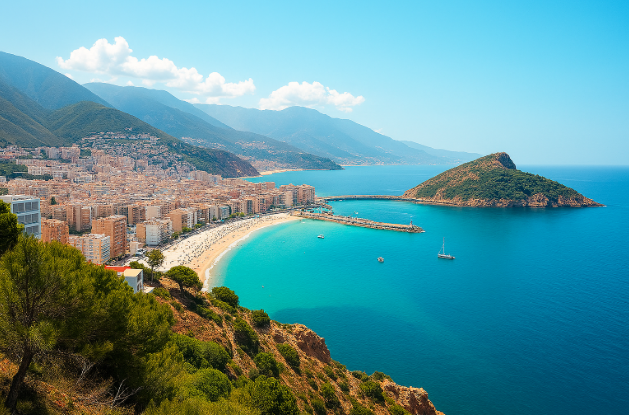If you’re asking “Is it safe to travel to Cyprus with the trouble in Israel?”, you’re seeking clarity amid regional volatility. Cyprus is still relatively safe despite the escalating hostilities between Iran and Israel. This article explores current advisories, risk factors, flight operations, tourism statistics, and traveller precautions, helping you make a confident choice.
What is the current security situation in Israel and Cyprus?
What incidents in Israel could affect travel to Cyprus?
After exchanging attacks in mid-June, increased military engagement between Israel and Iran resulted in a truce on June 24, 2025. These events triggered a temporary airspace closure and diverted flights. Though Cyprus is geographically near, there were no security incidents on the island. However, proximity has increased traveller anxiety, making it essential to monitor developments through reliable sources like the UK Foreign Office.
How has Cyprus responded in terms of border control and safety measures?
By stepping up monitoring at important transportation hubs, particularly the airports in Larnaca and Paphos, Cyprus has taken a proactive approach. Local police and the National Guard remain on alert but have reported no credible threats to public safety. The Republic of Cyprus maintains regular coordination with UK intelligence via RAF Akrotiri, ensuring the latest developments are swiftly addressed.
- Increased marine patrols along the island’s southern coast.
- Enhanced entry screening protocols for travellers from high-risk zones.
- Distribution of multilingual safety leaflets in airports and ports.
How does unrest in Israel directly impact Cyprus travel safety?

Is there a risk of violence or terrorism reaching Cyprus?
The likelihood remains low. Cyprus is not a target in the current conflict and does not share borders with Israel. Historically, the island has maintained political neutrality in Middle Eastern affairs, minimising risk. The UK’s Foreign Office classifies Cyprus as a low-risk destination, and no recent incidents have been linked to terrorism or regional spill-over.
- Cyprus raises its image diplomatically by hosting many UN peacekeeping deployments.
- Routine safety drills are conducted in tourist areas.
- Local authorities maintain emergency readiness protocols, especially during peak tourist season.
Can regional instability affect flights or ferry routes?
Yes, particularly if airspace restrictions extend. During the Israel-Iran escalation, some airlines rerouted over Syrian and Lebanese airspace, affecting flight durations. However, direct flights to Cyprus from the UK, Germany, and other EU countries remain unchanged. Ferry services, particularly between Limassol and Greek ports, have operated uninterrupted. Travellers should still confirm bookings 24–48 hours prior to departure.
Is it safe to travel to Cyprus right now from the UK?
Yes. The UK FCDO does not advise against travel to Cyprus, noting only that regional tensions could escalate. Flights from the UK are operating normally and tourism continues as usual
What are the travel advisories saying?
What does the UK Foreign Office advise about Cyprus travel?
The FCDO continues to classify Cyprus as a safe destination. It advises standard safety precautions such as avoiding demonstrations, especially near embassies or government buildings. Travellers are also encouraged to register with the FCDO’s Travel Aware service and follow updates from the British High Commission in Nicosia. The absence of travel warnings suggests continued confidence in Cyprus’s safety protocols.
- Keep emergency contacts accessible.
- Follow local curfews or restrictions if implemented.
- Use official taxis and regulated transport services.
What are other countries’ government advisories?
The US Department of State, Global Affairs Canada, and Australia’s SmartTraveller all rank Cyprus as a low-risk country. These governments recommend caution due to the general regional situation but do not suggest avoiding travel. Their unified stance supports the conclusion that Cyprus is safe despite nearby unrest.
What travel and entry requirements apply?
Are there entry updates due to regional unrest?
No. Cyprus has not imposed any additional screening or travel bans in response to Middle Eastern tensions. UK nationals can enter Cyprus visa-free for up to 90 days. Standard documentation—a passport valid for at least three months beyond the date of return—is required. Border procedures remain swift and efficient.
- Electronic passport scanners help streamline entry.
- Family and group entries are processed quickly at dedicated counters.
- Emergency visa services are available for stranded transit passengers.
What health formalities remain in place?
COVID-19 restrictions have been fully lifted as of early 2024. Cyprus has a modern, easily accessible healthcare system with numerous English-speaking medical specialists. Travellers are advised to carry a GHIC (or EHIC for EU citizens) to cover basic emergency care. Comprehensive insurance is recommended for private treatment or repatriation needs.
- Local pharmacies are well-stocked and accessible.
- Private clinics accept walk-in patients and major insurance providers.
- Emergency hotlines (ambulance, fire, police) are active 24/7.
What do tourism numbers show?

Are UK tourists still visiting en masse?
Yes. . In Cyprus, British tourists continue to be the most popular group. Despite concerns about nearby conflict, over 1.34 million visitors travelled to Cyprus in the first five months of 2025—a 14.9% increase from 2024. Tourists have reported no disruption to beach resorts, archaeological sites, or public transport, reinforcing the island’s safe and inviting atmosphere.
- Repeat visitation rates for UK tourists are above 65%.
- Key resort towns like Ayia Napa and Paphos report high hotel occupancy.
How resilient is tourism to regional crises?
Tourism in Cyprus has weathered multiple regional crises—Lebanon conflict, Syrian war, and COVID-19—without severe impact. The nation’s economic dependence on tourism ensures that safety, hospitality, and infrastructure are prioritised. In times of unrest, the government enhances patrols in tourist areas and offers multilingual assistance at major hotels and airports.
What practical precautions should travellers take?
| Precaution | Why it’s important |
|---|---|
| Sign up to Travel Aware | Receive live updates from the UK Government |
| Check airline/ferry status daily | Airspace or sea routes may adjust unexpectedly |
| Avoid military, RAF bases, protests | These can be sensitive locations |
| Stay alert in public venues | For safety and pickpocketing prevention |
| Carry GHIC/EHIC | Ensures emergency healthcare access |
What about travel insurance?
Is Cyprus still insurable during this period?
Absolutely. Cyprus is not under any advisory that would void standard travel insurance. However, policies vary, so travellers should confirm that coverage includes cancellations due to nearby unrest or transportation disruption. Some insurers now offer “disruption protection” clauses that provide added peace of mind.
- Read policy exclusions carefully.
- Check if natural disasters or war clauses are activated.
- Add an upgrade for flight delay compensation where possible.
Could unrest escalate unexpectedly?
What do experts predict?
Analysts at regional think tanks suggest that while the Israel-Iran ceasefire holds, any single event could reignite tensions. However, Cyprus is unlikely to become directly involved. It is viewed more as a diplomatic and logistical outpost for international operations than a strategic military target.
- Cyprus often mediates EU-Middle East negotiations.
- The UK and US maintain active military coordination based out of the island.
What should your contingency plan include?
Always have alternative flights and accommodation options. Register with your country’s embassy. Keep digital and printed copies of your documents. Purchase refundable tickets and hotel stays where possible. If you need help with last-minute rebooking, think about hiring a travel adviser.
What misconceptions should you ignore?
“Cyprus is unsafe because it’s near Israel” – myth or reality?
This is a myth. Despite its proximity, Cyprus has a distinct political and geographical identity. It has been peaceful for decades and hosts several UN and international missions. The separation by sea from Israel also reduces potential spill-over threats.
- No known cases of spill-over violence in modern history.
- Major airlines continue to list Cyprus as a green-zone destination.
- Layered security is ensured in Cyprus through diplomatic immunity zones.
“All flights are being cancelled” – is that true?
False. Only flights to Tel Aviv and surrounding regions have faced interruptions. UK-Cyprus routes continue without issue. Airlines like easyJet, British Airways, and Jet2 are operating full summer schedules to Larnaca and Paphos.
- Charter flights are also running at full capacity.
- Airports maintain multilingual help desks.
- Travel aggregators report stable pricing for Cyprus-bound flights.
Is Cyprus safe for Jews?
Yes. Cyprus is regarded as safe and welcoming for Jewish residents and visitors. Jewish infrastructure is growing—schools, synagogues, community centres—and there’s no recent rise in antisemitic incidents
What personal experiences back this up?

Do tourists still report safe, pleasant stays?
Yes. Recent visitors from the UK and Germany have reported seamless holidays with no security issues. Feedback on TripAdvisor and Google Reviews often praises the safety of nightlife, family attractions, and coastal resorts like Protaras and Limassol.
- Quick emergency response times for minor accidents.
- Warm hospitality and multilingual staff.
- Easy access to embassies and consulates if needed.
Tourism data supports visitor confidence
Statistics show steady growth even during regional conflict. This demonstrates that travellers consider Cyprus a safe haven within the Mediterranean. Return visitors and extended-stay bookings are both trending upward.
- According to Google Trends, more people are searching for “Cyprus 2025 holidays.”
- Airlines are expanding seat capacity to meet demand.
- Hotel chains are offering long-stay discounts due to high booking confidence.
Is it still safe to fly to Israel?
The UK FCDO currently advises against all travel to Gaza, border zones near Gaza, the Golan Heights, and areas within 500 m of Lebanon, and advises against all but essential travel to other parts of Israel and the Palestinian Territories. Given missile and drone threats from Iran and others, flying there remains risky.
Conclusion – Is it safe to fly to Israel?
In answer to your central question—is it safe to travel to Cyprus with the trouble in Israel?—the answer is a qualified yes. The island remains clear of active conflict, with:
- No FCDO travel ban – Cyprus is open and safe to visit
- Fully operational travel links, with no UK flight cancellations
- Strong tourism resurgence, including UK visitors
Just ensure you:
- Stay informed and flexible
- Avoid demonstrations and sensitive zones
- Maintain a current GHIC or EHIC and sufficient insurance.
With these measures, you can enjoy Cyprus’s famed beaches, historic sites, and hospitality with peace of mind.
FAQ – Is It Safe to Travel to Cyprus With the Trouble In Israel?
1. Should I worry about military activity near RAF Akrotiri?
No—this is a secure facility. Tourists are advised to avoid taking photos or straying into restricted areas.
2. What if the ceasefire breaks during my trip?
Stay calm, monitor local news, and follow FCDO alerts. Embassies are equipped to assist.
3. Are ferry services from Cyprus to Greece still running?
Yes—routes like Limassol to Piraeus operate normally. Book through official platforms for updates.
4. Is it safe to travel with family during this period?
Absolutely. Families with children continue to travel safely to Cyprus with no reported incidents.
Related Posts:

I’m Adam Milne, a business writer and co-author at UKBusinessMag.co.uk. I’m passionate about simplifying complex topics—whether it’s tax, startup strategy, or digital marketing—so that entrepreneurs can take action with confidence. With years of experience in small business consultancy, I bring a practical perspective to every piece I write, helping readers turn ideas into results.



